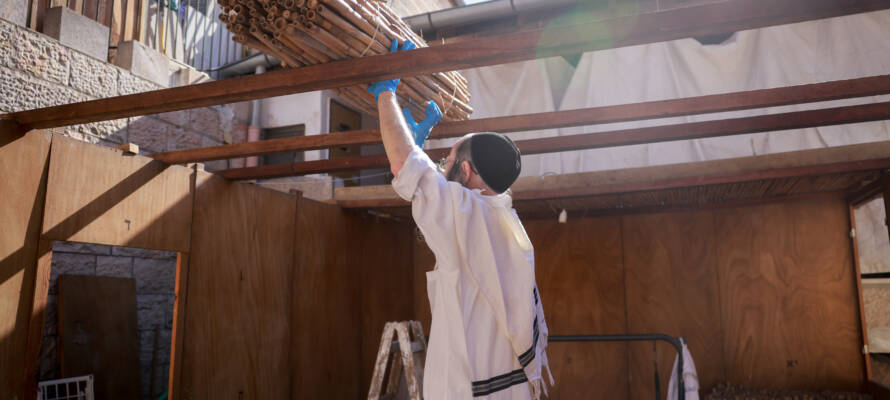This column is based on the writings of ancient Jewish sages.
By Ambassador (ret.) Yoram Ettinger
– Sukkot, the Feast of Tabernacles (September 30 – October 7, 2023) derives its name from the first stop of the Exodus – the town of Sukkot – as documented in Exodus 13:20-22 and Numbers 33:3-5. Sukkot was also the name of Jacob’s first stop west of the Jordan River, upon returning to the Land of Israel from his 20 years of work for Laban in Aram (Genesis 33:17).
– Sukkot is a Jewish national liberation holiday, commemorating the Biblical Exodus, and the transition of the Jewish people from bondage in Egypt to liberty, the ongoing Jewish ingathering to the Land of Israel, and sovereignty in the Land of Israel, which inspired the US Founding Fathers and the Abolitionist Movement.
The construction of the Holy Tabernacle, during the Exodus, was launched on the first day of Sukkot (full moon).
– Sukkot is the 3rd 3,300-year-old Jewish pilgrimage holiday (following Passover and Shavou’ot/Pentecost), highlighting faith, reality-based-optimism, can-do mentality and the defiance of odds. It is also the 3rd major Jewish holiday – following Rosh Hashanah and Yom Kippur – in the month of Tishrei, the holiest Jewish month. According to Judaism, 3 represents divine wisdom, stability and peace. In addition, the 3rd day of the Creation was blessed twice; God appeared on Mt. Sinai 3 days after Moses’ ascension of the mountain; there are 3 parts to the Bible (the Torah, Prophets and Writings); the 3 Jewish Patriarchs; the 3 annual pilgrimages to Jerusalem, etc. 3 is the total sum of the basic odd (1) and even (2) numbers, symbolizing strength: “a three-strand cord is not quickly broken (Ecclesiastes 4:12).
– Sukkot underscores the gradual transition from the spiritual state-of-mind during Rosh Hashanah and Yom Kippur to the mundane of the rest of the year, and from religious tenets of Judaism to the formation of the national, historic and geographical Jewish identity.
– The 7 days of Sukkot – which is celebrated in the 7th Jewish month, Tishrei – are dedicated to 7 supreme guests-in-spirit and notable care-takers (Ushpizin in Aramaic and Hebrew): Abraham, Isaac, Jacob, Joseph, Moses, Aaron and David. They were endowed with faith, reality-based-optimism, humility, magnanimity, principle-driven leadership, compassion, tenacity in the face of daunting odds and peace-through-strength.
– Sukkot features the following four species (Leviticus 23:39-41): 1 citron (representing King David, the author of Psalms), 1 palm branch (representing Joseph), 3 myrtle branches (representing the three Patriarchs) and 2 willow branches (representing Moses and Aharon, the role models of humility), which are bonded together, representing the unity-through-diversity and strength-through-unity.
They embody four leadership prerequisites: a solid backbone (palm branch), humility (willow), a compassionate heart (citron) and penetrating eyes (myrtle).
These species also represent the agricultural regions of the Land of Israel: the southern Negev and Arava (palm); the slopes of the northern Golan Heights, Upper Galilee and Mt. Carmel (myrtle); the streams of the central mountains of Judea and Samaria, including Jerusalem (willow); and the western coastal plain (citron).
– Traditionally, Sukkot is dedicated to the study of the Biblical Scroll of Ecclesiastes (Kohelet, קהלת in Hebrew, which was one of King Solomon’s names), written by King Solomon, which highlights humility, morality, patience, learning from past mistakes, commemoration and historical perspective, family, friendship, long-term thinking, proper timing, realism and knowledge.
The late Senator Robert Byrd (D-WV), the longest serving US Senator, often quoted Biblical verses, in general, and Ecclesiastes, in particular. For example, on November 7, 2008, upon retirement from the chairmanship of the Senate Appropriations Committee, he stated: “’To everything there is a season and a time for every purpose under heaven.’ Those Biblical words from Ecclesiastes 3:1 express my feelings about this particular time in my life.” On September 9, 1998, Senator Byrd made the following Senate floor remarks on the Lewinsky affair: “As the book of Ecclesiastes plainly tells us, ‘There is no new thing under the sun.’ Time seems to be turning backwards in its flight. And, many of the mistakes that President Nixon made are being made all over again.”
– During the holiday of Sukkot, it is customary to highlight humility by experiencing a seven-day-relocation from one’s permanent dwelling to the temporary, humble, wooden booth (Sukkah in Hebrew) – which sheltered the people of Israel during the Exodus.
